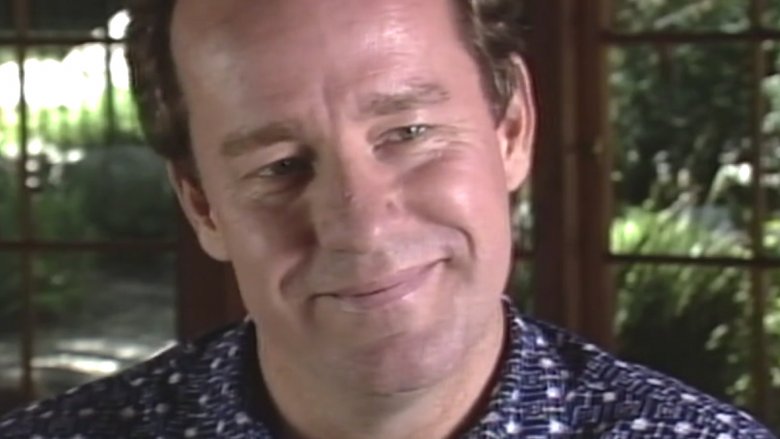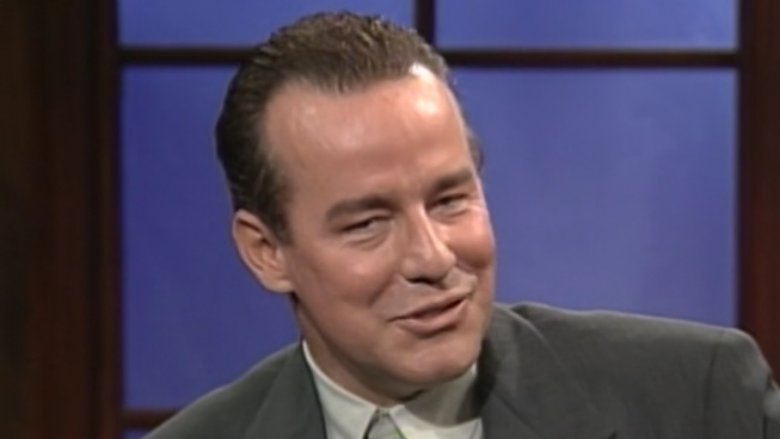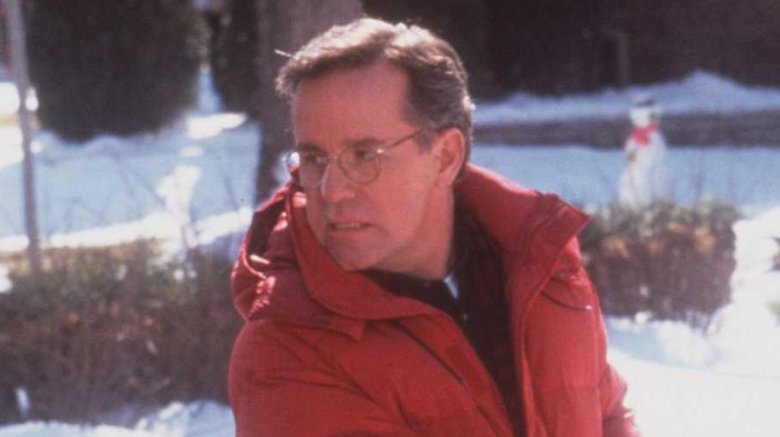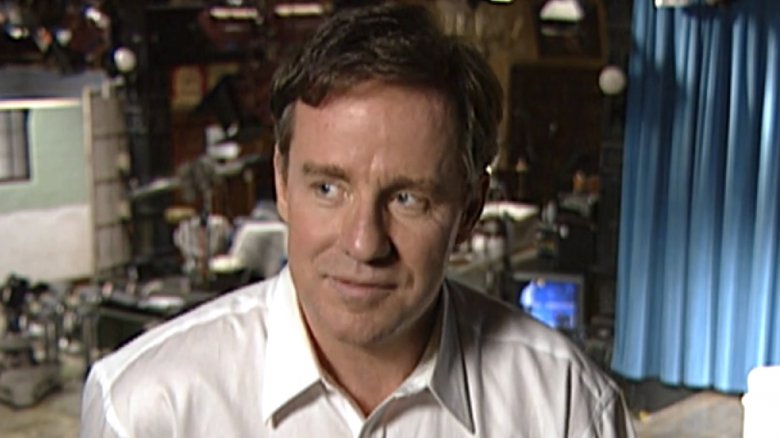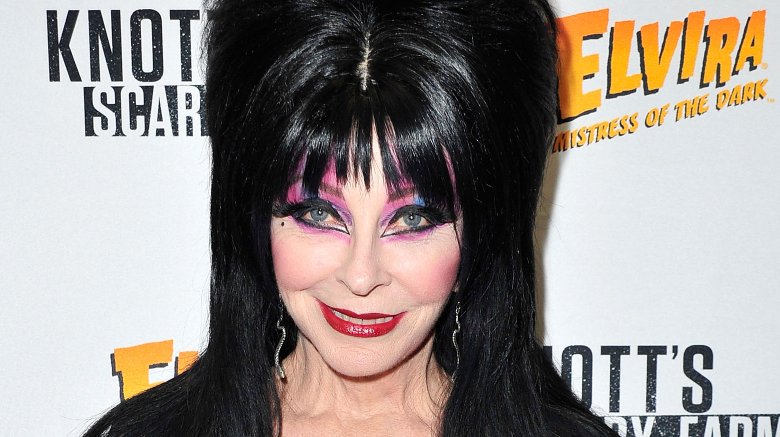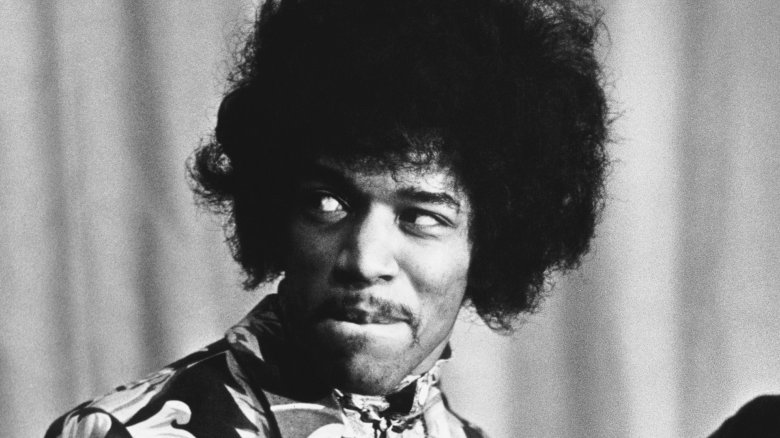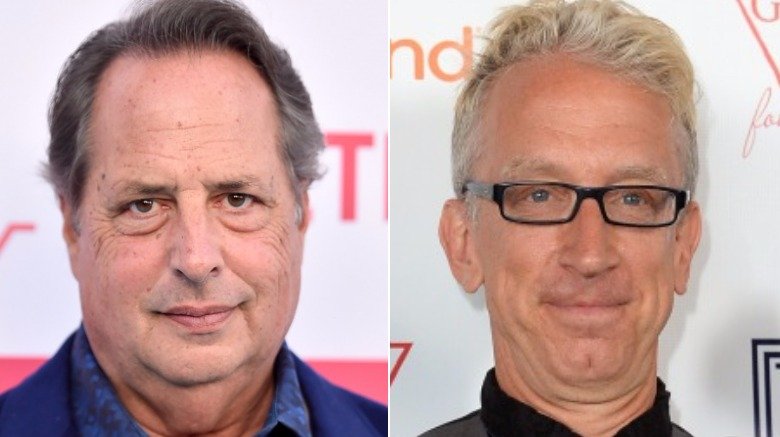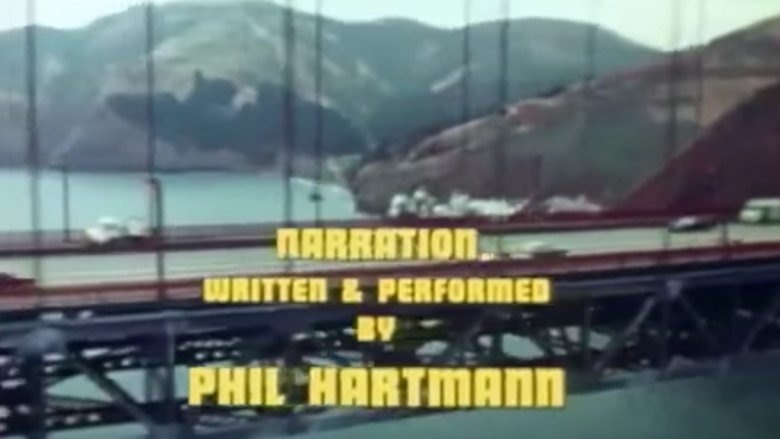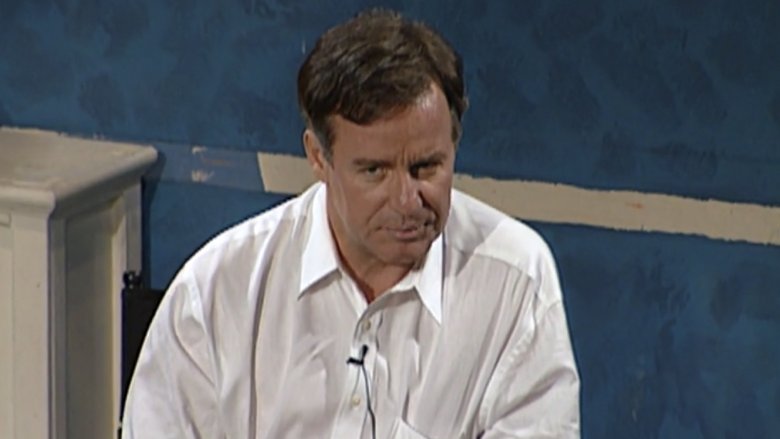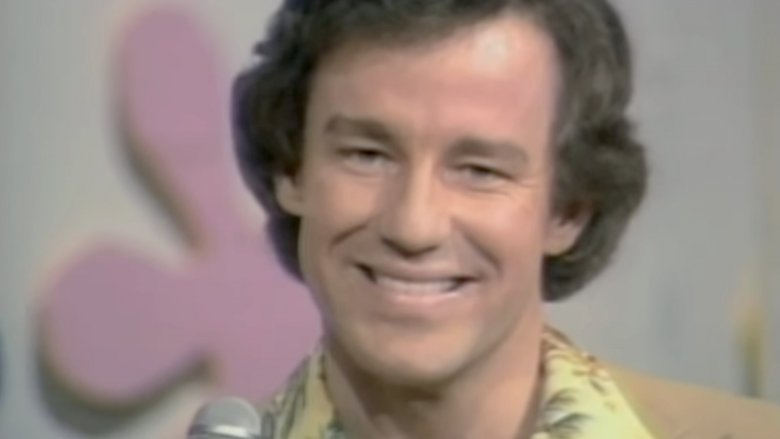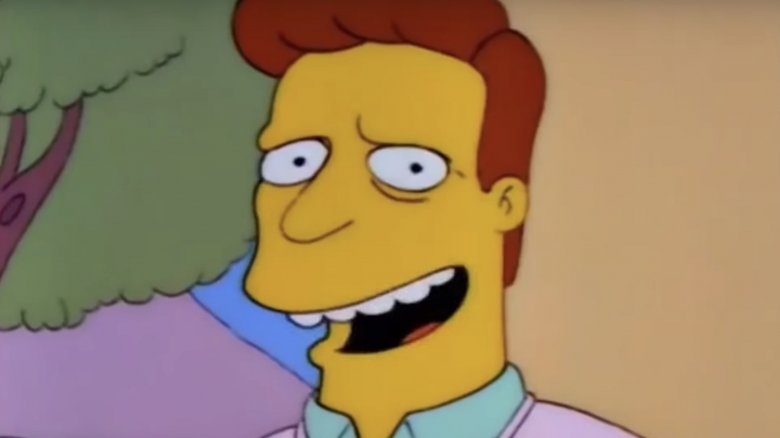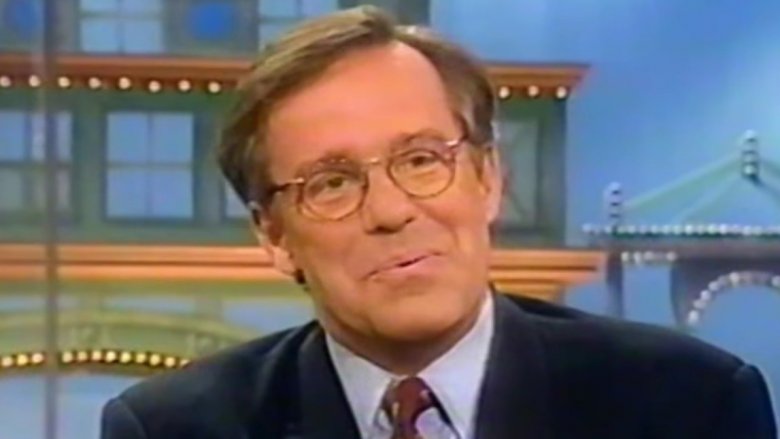The Untold Truth Of Phil Hartman
On May 28, 1998, comedian Phil Hartman was reportedly fatally shot by his intoxicated wife, Brynn, as he lay asleep at their residence in Encino, Calif. Meanwhile, their two children, Sean and Birgen, were asleep in the house. A few hours later, Brynn committed suicide, shooting herself in the head with another gun from the Hartmans' collection (via Time). Authorities discovered both bodies in their upstairs bedroom.
The crime shocked the world as fans and friends mourned, wondering what had gone wrong. Hartman's consistently brilliant work on Saturday Night Live had turned him into a household name, and his portrayal of the megalomaniacal Bill McNeal on the NBC sitcom NewsRadio earned him even more admirers. Hartman also appeared on 52 episodes of The Simpsons, voicing both Lionel Hutz and Troy McClure throughout the '90s.
Born Sept. 24, 1948 as Philip Edward Hartmann, the comic legend was the fourth of eight children and considered himself a "middle child" (via People). Prior to finding his true calling in 1975 as part of the legendary comedy troupe the Groundlings, Hartman worked as a graphic designer. He ultimately became an Emmy-winning SNL player, master impressionist, screenwriter, and actor.
But there's a lot most don't know about Hartman. Here are some lesser-known facts about this brilliant comedian.
His sister Sarah Jane was disabled
Hartman's younger sister Sarah Jane was born with Angelman syndrome, a rare genetic disorder characterized by "delayed development, intellectual disability, severe speech impairment, and problems with movement and balance," according to Genetics Home Reference. People with Angelman syndrome also tend to be hyperactive and are highly prone to seizures.
According to Mike Thomas' Phil Hartman biography You Might Remember Me, Sarah Jane needed constant around-the-clock care from the moment she was born. After tending to Sarah Jane for five years, Hartman's mother, Doris, was exhausted and was reportedly hospitalized after suffering a breakdown. Soon after Doris recuperated, the family decided to place Sarah Jane in a facility that could better handle her needs.
Phil Hartman may have grown up irrationally thinking that Sarah Jane's condition was somehow his fault. "He thought what was wrong with her had something to do with him," revealed older brother John. In 1957, Hartman moved to the United States with his family, but Sarah Jane remained in the facility in Canada.
His ex-wife received a disturbing letter from Brynn
According to his Hartman's friends, something was wrong with Brynn and her husband knew it. "She was a failed actress who deeply resented [Phil's] success," said NewsRadio star Joe Rogan during a 2014 Nerdist podcast (via National Enquirer), "and as he became more and more successful, their relationship became more and more contentious." According to the biography You Might Remember Me, Hartman would sometimes show up to set with scratches on his face after fighting with Brynn the night before (via The New York Post). Hartman's second wife, Lisa Strain, alleged that Brynn was pathologically jealous of other women. After sending a card to Hartman and Brynn in 1988 to congratulate them on the birth of their son, Strain claimed she received a blistering four-page screed in the mail, written by Brynn and threatening her life in no uncertain terms.
Strain claimed Brynn threatened to "rip [her] eyes out," and that, if she didn't stay away from Hartman and the baby, "she'd kill [her]." Understandably upset, Strain called Hartman and asked him to explain the letter. He'd allegedly told her that Brynn had asked him whether he considered her his soul mate, and he'd said no ... but he did consider Strain a soul mate.
According to Strain, Hartman made light of the situation, telling her, "You should have seen the letter she wanted to write." Fed up, Strain hung up on Hartman and didn't speak to him for two years.
Phil Hartman designed several iconic album covers
Before establishing himself as a comedian and actor, Phil Hartman worked for many years as a graphic designer. As Fast Company reported, his design work was the comedian's "first calling," and Hartman received a graphic arts degree in 1974 from Cal State Northridge.
After he graduated, Hartman designed more than 40 album covers over the course of the next decade for bands like Steely Dan and America. He also created the iconic, sigil-like logo for Crosby, Stills, and Nash that seemed to draw its inspiration from Celtic knots. "I think my most famous was Poco's Legend," Hartman told the Las Vegas Sun in 1998. He claimed frontman Rusty Young wanted Hartman to illustrate a horse for the cover: "I drew the image maybe 20 times, until I came up with the cover that I'm very proud of."
However, the demands of his graphic design career eventually drove him to find a release — which he found in the Groundlings. "I was working 12 hours a day at a drawing board all by myself, and I was going nutso," Hartman revealed in a 1995 interview (via CNN). "I just started getting up on stage and talking. And I loved it. I did it for 10 years just for the fun of it."
He had a falling out with Elvira
As details of Phil Hartman's murder emerged in May 1998, actress Cassandra Peterson was one of the first people to shed light on the troubled relationship between him and Brynn. "They fought a lot," she told Mr. ShowBiz (via CNN). "I don't know what the problems were. I have suspicions."
Peterson, best known for her portrayal of the iconic "Elvira, Mistress of the Dark," called Brynn, "a very troubled person with a lot of problems." She told Mr. Showbiz that she'd tried discouraging Hartman from marrying her in 1987. "She put a serious damper on our friendship," she said. According to the Los Angeles Times, Peterson's 2001 movie Elvira's Haunted Hills was "released in memory" of Hartman. The two performers had known each other from their years in the Groundlings.
"Phil was one of my best friends," she told Retro Junk in 2012, adding that he "was a very sincere and honest individual." But the two comedians had a falling out after Hartman told Peterson he was proposing to Brynn. "Oh God, no!" she'd allegedly blurted, claiming Hartman was beyond offended by her reaction. "He got up from his chair, and it's the first time — and, I think, last time — I ever saw him angry."
The Jimi Hendrix connection
While still in his early 20s, Phil Hartman had a stint working as a roadie for Rockin Foo, a "psychedelic garage country rock" band from California, according to The Final Vinyl. Hartman also designed the album covers for the band's two self-titled records, released in 1969 and 1971. In You Might Remember Me, biographer Mike Thomas reported that this scruffy hippie version of Hartman had the time of his life. As he tagged along with the merry band of musicians, he thought everyone involved was "super b*tchen."
One night, Rockin Foo performed a gig at short-lived rock venue Thee Experience, which was often crawling with up-and-coming rock acts like Alice Cooper, Joe Cocker, and Poco. One night, Jimi Hendrix suddenly waltzed into the joint and climbed onstage, proceeding to rock out. Noticing that a broken bass drum threatened to derail the performance, Hartman's roadie instincts kicked in. He climbed onstage, fell to his knees, and held the misbehaving drum in place for the remainder of the song. All the while, young Hartman was understandably "in awe" of the rock legend.
Jon Lovitz and Andy Dick fought bitterly about Hartman for years
In 2007, comedian Jon Lovitz visited The Dennis Miller Show and detailed his many skirmishes with troubled performer Andy Dick over the years (via CBS News). The tension stemmed from Lovitz's tenure on NewsRadio, which began in 1998 following Hartman's murder. Describing his time on the show, Lovitz claimed Andy Dick was constantly "complaining and really giving [him] a hard time for no reason." Lovitz said he once lashed out, telling Dick he knew he'd given Brynn cocaine at a Christmas party, thus breaking her decade-long sobriety. "Well, I wouldn't be here if you hadn't given Brynn coke in the first place," he told Dick.
Lovitz and Dick reportedly sorted out their differences and were on good terms for years, but their good relationship didn't last. One night, Lovitz ran into an intoxicated Andy Dick at a restaurant, and Dick allegedly said to him, "I put the Phil Hartman hex on you, you're the next one to die." Lovitz had Dick escorted out, but they ran into each other again a few nights later at the Laugh Factory in Los Angeles. Lovitz asked Dick to apologize, and Dick allegedly responded, "You know why I said that? Because you said I killed Phil Hartman, that's the first thing you said to me." In response, Lovitz pushed Dick "really hard and [he] smashed his back and his head into the bar."
Hartman's passive nature may have infuriated Brynn
Hartman openly described himself as having "a passive, people-pleasing, middle-child mentality."
That passive nature allegedly led to problems in his personal relationships, particularly when romance entered the picture. "He would disappear emotionally," said his second wife, Lisa Strain. "Phil's body would be there, but he'd be in his own world. That passivity made you crazy." It sounds like his easy-going demeanor turned into passive-aggressiveness, too. Whenever Strain would confront Hartman about his detachedness, he'd allegedly tell her, "You're getting in the way of my career, and this is who I am and what it's going to be like."
When paired with someone who leans towards insecurity and hysteria, that sort of passive nature can be disastrous. According to the Hartford Courant, Hartman and Brynn argued a lot over the course of their 11-year marriage, and those fights usually had to do with Brynn's ongoing issues with alcohol and drugs. Steven Small, Hartman's lawyer and friend, said the couple had a conspicuous "pattern of arguing at night" and that Hartman "would go to sleep and everything would be OK in the morning." On the night of the murder, Small thinks Hartman "felt safe going to sleep, and he just shouldn't have."
He narrated the bizarre 1980 film Skateboard Madness
Chances are you've never taken a good look at Skateboard Madness, a little-known 1980 melodrama that's very much a product of its time. The admittedly underwhelming film involves a professional skateboard photographer whose boss insists that he go out and take some truly game-changing skateboarding photos, or else he'll find himself out of a job.
Phil Hartman was somehow cast as the film's narrator, and he can clearly be heard barking out lines like, "Well, it appears that Mellow Cat is going to have to set his musical career aside and get down to the duties at hand." He's listed as Phil Hartmann in the credits, since the film was made before he dropped the second "N" in his name and legally changed his moniker in 1992. He did so because of I Ching tenets: "Phil Hartmann" is attached to destiny number 8, implying ambition and a simple life, while "Phil Hartman" has destiny number 3, which is "the height of artistic fulfillment" (via TV Guide).
As for Skateboard Madness, Hartman would soon skate onto considerably greener pastures. He collaborated with fellow Groundlings cohort Paul Reubens for many years, co-writing the brilliant Pee Wee's Big Adventure screenplay. On the week Reubens hosted Saturday Night Live, he decided to take Hartman along. "That was Phil's introduction to Lorne Michaels," Reubens told Westword in 2016.
Why was he nicknamed 'The Glue?'
There's a reason fellow Saturday Night Live castmates called Phil Hartman "The Glue."
"He kind of held the show together," series creator Lorne Michaels explained to People in 1998. He also had a gravitas that ensured a sketch would always stick the landing, even if the premise was paper-thin and nobody quite knew what they were doing. As former SNL regular Julia Sweeney told Grantland in 2014, a routine wouldn't "go completely off the rails if Phil's in the sketch."
Hartman was also nicknamed "The Glue" because of his uncanny ability to completely shuck off his real personality and wholly transform into whatever character he'd been tasked to play. "He poured the Phil out and morphed into the madman inside of his character," said former SNL writer Rosie Shuster.
Hartman reportedly lamented never creating a breakout character like Julia Sweeney's Pat or Mike Myers and Dana Carvey's Wayne and Garth, but Sweeney claimed Hartman's fellow castmates never thought he needed one. "I felt we all understood how much harder his job was than ours," she said, commenting on his knack for holding entire sketches together. "We wanted him just as he was."
He was a contestant on The Dating Game (and got stood up)
According to the Daily Mail, Phil Hartman appeared on The Dating Game as a contestant in 1979, and it was one of his very first television appearances. Introducing young Hartman, host Jim Lange revealed a few little-known facts about the eventual Saturday Night Live star, claiming "he's appeared on over 100 radio commercials" and "makes the best avocado sandwich in the world."
His potential ladylove — the "sensuous Gina Russell" — asked Hartman what road sign she should heed before going on a date with him. "Slippery when wet," he quipped. As the crowd hooted, Hartman clarified, "No, no, no, they've got the wrong idea: I like to swim, and sometimes I get slippery." Though Russell ultimately chose Hartman, she stood him up on their first date, a romantic getaway to the Monterey Peninsula. "I think her parents vetoed it," Hartman told the Las Vegas Sun in 1998, a mere two weeks before his murder.
All in all, it sounds like Hartman was rather embarrassed about his appearance on the show: "They told us, 'If you win, act excited.' So I acted like a complete idiot" (via CNN).
Promising projects were in the works
Phil Hartman famously voiced Troy McClure on The Simpsons from 1991 to 1998, and it was reportedly his all-time favorite character. Series creator Matt Groening loved Hartman for "his brilliant comic acting and easy-going enthusiasm," according to a 1998 statement following his murder. Groening later added that Hartman had "the twinkle in his eye" of "a performer fully enjoying himself."
Hartman was originally cast as Zapp Brannigan on Groening's cartoon Futurama, but he was murdered before he could contribute. The role went to Billy West instead. "When [Phil] died, they asked me if I wanted to give it a whirl," West told Animation Magazine in 2012. "We both loved doing the voices of these big dumb announcers who sound really pompous."
At the time of his death, Hartman was working on several projects. According to Vulture, he wanted to create a live-action film based on McClure. No script was written, but plenty of writers expressed interest in the idea. As early as 1986, Hartman was eager to help Jon Lovitz get his character "The Liar" up on the silver screen, telling the Los Angeles Times, "We're feverishly trying to get the first draft finished." He also lent his vocal talents to the titular character in Blasto, a PlayStation game released in March 1998. "My little boy loves it and I hope it does well," he told the Las Vegas Sun. A sequel was reportedly in the works, but it was canceled after Hartman's murder.
He was looking forward to the future
In the hours before Phil Hartman's murder, Brynn was reportedly in a good frame of mind. Two days prior to the murder-suicide, she'd even booked an "Endless Courtship" spa treatment for the couple, according to People.
"I know they were both really looking forward to the summer," said family friend Andrea Diamond in 1998. "They were just trying to get through the month of May." According to Debbie Avellana, another friend of Phil's, the comedian "had a three-year plan." At the time, he was raking in $50,000 per NewsRadio episode, and he allegedly planned to use that money to retire to Catalina Island. "His attitude was that his wife should hang on for a couple more years and then they would get to be together all the time," Avellana said.
From the outside looking in, the couple seemed to be doing well. They were going to counseling together and had been getting along, and Brynn's various demons appeared to be under control. A 1997 interview with National Catholic Reporter's Mark Pattison even suggested Hartman had found some solace in his newly revived Catholic beliefs. Shortly after his father died, Hartman told Pattison, "Faith has guided me to believe [death is] a rebirth. We are set free from this mortal coil, and we'll see wonders beyond our imagination."

